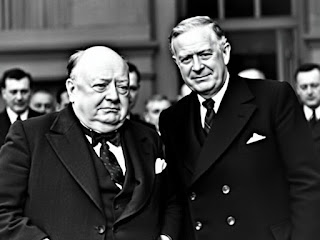Winston Churchill: The Iconic Leader Who Shaped History
Introduction
Winston Churchill, one of the most influential figures of the 20th century, was a British statesman, military leader, and writer whose legacy is forever tied to his leadership during World War II. Known for his indomitable spirit, stirring oratory, and steadfast determination, Churchill played a pivotal role in rallying the United Kingdom and the world to stand against Nazi tyranny. His courage and vision not only led to the defeat of fascism but also shaped the post-war global order.
Early Life and Education
Winston Leonard Spencer Churchill was born into a prominent British family on November 30, 1874. Winston Churchill was born to Lord Randolph Churchill, a prominent political figure, and Jennie Jerome, an American socialite known for her charm and influence. Churchill was keenly interested in military affairs and history from an early age. Despite attending Harrow School, Churchill's academic achievements were relatively modest and did not stand out. Despite early setbacks, Churchill entered the Royal Military Academy at Sandhurst, where he excelled and began a lifelong association with the British Army.
Political Beginnings and Early Career
Churchill began his career with notable experiences as both a war correspondent and a soldier, gaining firsthand exposure to global conflicts. He traveled to conflict zones in Cuba, India, Sudan, and South Africa during the Boer War. His bold and successful escape from captivity during the Boer War brought him widespread public acclaim. In 1900, Churchill began his political career as a Member of Parliament (MP) for the Conservative Party.
In 1904, he switched to the Liberal Party, advocating for progressive reforms, including labor rights, unemployment insurance, and military modernization. These initiatives played a crucial role in shaping Churchill's approach to leadership in the years to come.
Leadership During World War II
Churchill's defining moment came in 1940 when he was appointed Prime Minister during one of Britain's darkest hours. With Europe under Nazi control and Britain facing imminent invasion, Churchill delivered some of history's most inspiring speeches, including the famous "We shall fight on the beaches" address.
His unwavering resolve and ability to rally the nation through words and actions played a crucial role in sustaining British morale and resistance.
Strategic Leadership and Global Alliances
Churchill played a pivotal role in forging vital alliances with both the United States and the Soviet Union during World War II. His relationship with U.S. President Franklin D. Roosevelt was pivotal in bringing American resources and military strength into the war effort.
Churchill also played a significant role in planning key military operations, including the D-Day invasion in 1944, which marked a turning point in the war.
Post-War Years and the Iron Curtain Speech
After World War II, Churchill faced political setbacks, losing the 1945 general election. However, his influence remained significant. In 1946, he delivered the iconic "Iron Curtain" speech, highlighting the growing division between Western democracies and the Soviet Union, which marked the beginning of the Cold War.
In 1951, Churchill was re-elected as Prime Minister, focusing on Britain's post-war recovery and advocating for European unity.
Churchill the Writer and Nobel Laureate
In addition to his political career, Churchill was an accomplished historian and an exceptionally talented writer. His six-volume series, The Second World War, remains one of the most detailed accounts of the conflict. In recognition of his profound contributions to literature and his powerful speeches, Churchill received the Nobel Prize in Literature in 1953.
His literary contributions remain a cornerstone of historical scholarship and leadership studies.
Legacy and Global Influence
Winston Churchill's legacy is a tapestry of remarkable leadership, resilience, and strategic foresight. While his views on colonialism remain a subject of criticism, his contributions to defeating fascism, preserving democracy, and shaping the post-war world are undeniable.
His speeches, writings, and strategic vision continue to inspire leaders and thinkers worldwide.
Fascinating Facts About Winston Churchill
Beyond his political and literary contributions, Churchill was also a passionate painter, creating more than 500 works of art throughout his life.
In recognition of his contributions, Churchill was honored with honorary citizenship of the United States in 1963.
Churchill’s famous V-sign for victory became a global symbol of resilience.
Conclusion
Winston Churchill's life and career were marked by extraordinary achievements, resilience in the face of adversity, and an unwavering commitment to his country and democratic ideals. As a wartime leader, writer, and statesman, Churchill not only shaped the course of history but also left a legacy that continues to influence global leadership.
His courage, determination, and vision remind us of the power of strong leadership in the most challenging of times.
Find out my favorite Health and Fitness products here: https://linktr.ee/iamatiiq





.jpg)

.jpg)
Comments
Post a Comment